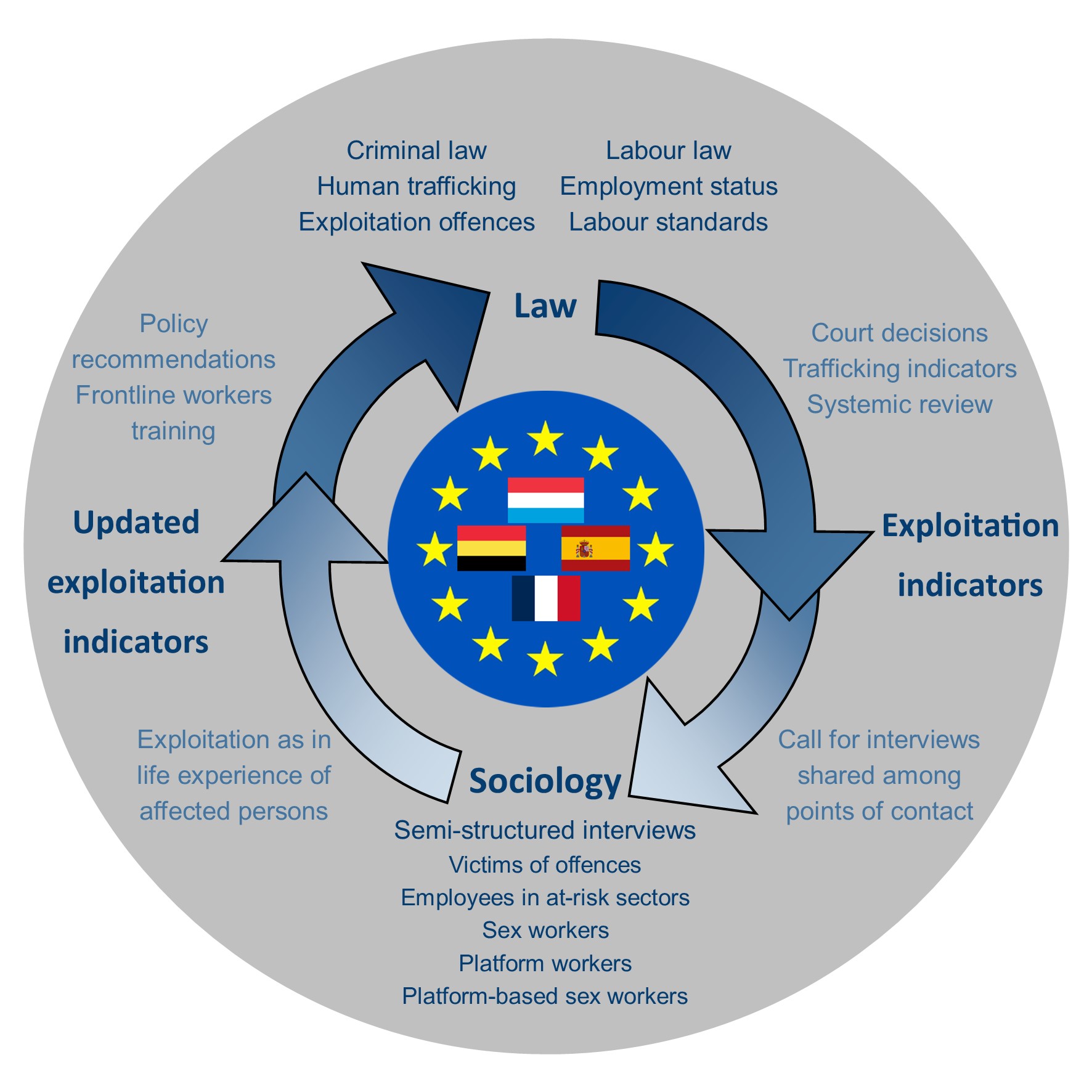Research objectives
The project’s objective is to develop an evidence-based, interdisciplinary framework for defining and addressing exploitation. This will involve analysing legal definitions, evaluating sociological risk indicators, and examining real-world case studies to propose a more effective approach to worker protection and victim identification.
The research aims to have a significant impact on practitioners, including law enforcement authorities, labour inspectors, and policymakers, both at national and European level. By providing a clearer operational definition of exploitation and updated risk indicators, the project will enhance the ability of these actors to identify and assist victims of exploitation offences and human trafficking. Additionally, it will contribute to the development of more effective legislative frameworks and enforcement strategies, ensuring that vulnerable workers receive adequate protection. Training materials and policy recommendations derived from the research will also support practitioners in applying the findings in real-world scenarios, leading to more consistent and just outcomes.
The legal concept of exploitation – Some context
The concept of exploitation is at the core of the division between criminalised and legitimate forms of work. Since the prohibition of slavery, national, European, and international norms have criminalised various forms of exploitation, such labour and sexual forms of exploitation. Furthermore, human trafficking refers to a process along coercive or deceptive means for the purpose of exploitation. Both trafficking and exploitation violate human rights of victims, and negatively affect economic and social development. Yet, no legal definition of exploitation is provided for by law or courts.
As a result, judicial authorities fluctuate regarding the necessary evidence to ensure conviction for these offences. Generally, judges offer no clear indications on the elements to delineate between criminalised and legitimate conditions of work. A lack of common understanding of exploitation results in different justice being provided to victims. Depending on interpretations, some people might not be acknowledged as victims. Therefore, they will not benefit from State protection. Research has already shown stereotypical identification practices, excluding the protection of, for instance, trafficked men or sex workers. Therefore, protection against exploitation presupposes the correct identification of exploitative situations and a clear understanding of their indicators to ensure posterior conviction.
However, not only criminal law tackles exploitation. Labour law is meant to reduce power inequalities between employers and employees and assure minimal labour standards. Yet, the protective aspect of labour law is challenged by the reduction or lack of protective provisions, and the circumvention to the employment relationships, both at the national and European levels. Thus, defining the scope of labour law and identifying whose workers are excluded from it is core to assessing the grey area between criminal and protected work situations. These issues are particularly relevant for the situation of platform workers, for which social sciences have raised practical concerns about working conditions. The sex work sector also fluctuates among various legal framework, in some countries, as an employment activity or an independent one. Aside labour protection, due to a stereotypical vision of trafficked victims, law enforcement authorities rarely identify criminal behaviours in this sector, whether the service is provided in person or platform based.
Why is this research needed?
The absence of a clear definition of exploitation has significant implications for the identification and protection of victims. In practice, inconsistent legal interpretations result in uneven access to justice and state protection. Without a harmonised framework, some victims are denied recognition.
The digitalisation of work further complicates this landscape. Platform workers operate in an ambiguous legal space where employment protections are limited, increasing their susceptibility to exploitative conditions. Similarly, sex workers face a lack of legal recognition, which exposes them to deceptive recruitment practices and exploitation. Thus, there is a need to connect work conditions prohibited under criminal law with the scope of the employment relationship.
As trafficking and exploitation are often transnational in the European context, a comparative perspective is necessary to produce adequate research results. The project seeks to address the inconsistencies in applying legal frameworks in different countries, thus promoting harmonised protection and legal action. Further research on this issue is particularly timely after the 2024 update to the anti-trafficking directive. As exploitation must also be framed with the digitalisation of work, this project will bring early insights from the Platform Work Directive.
Methods

Results
LANNIER, S., Wozniak-Cole, V., & El Dekmak, N. (July 2025). The 2024 EU Human Trafficking Directive: A comprehensive update? Journal of Human Trafficking, Enslavement and Conflict-Related Sexual Violence, 6 (2025/1), 27 – 52.